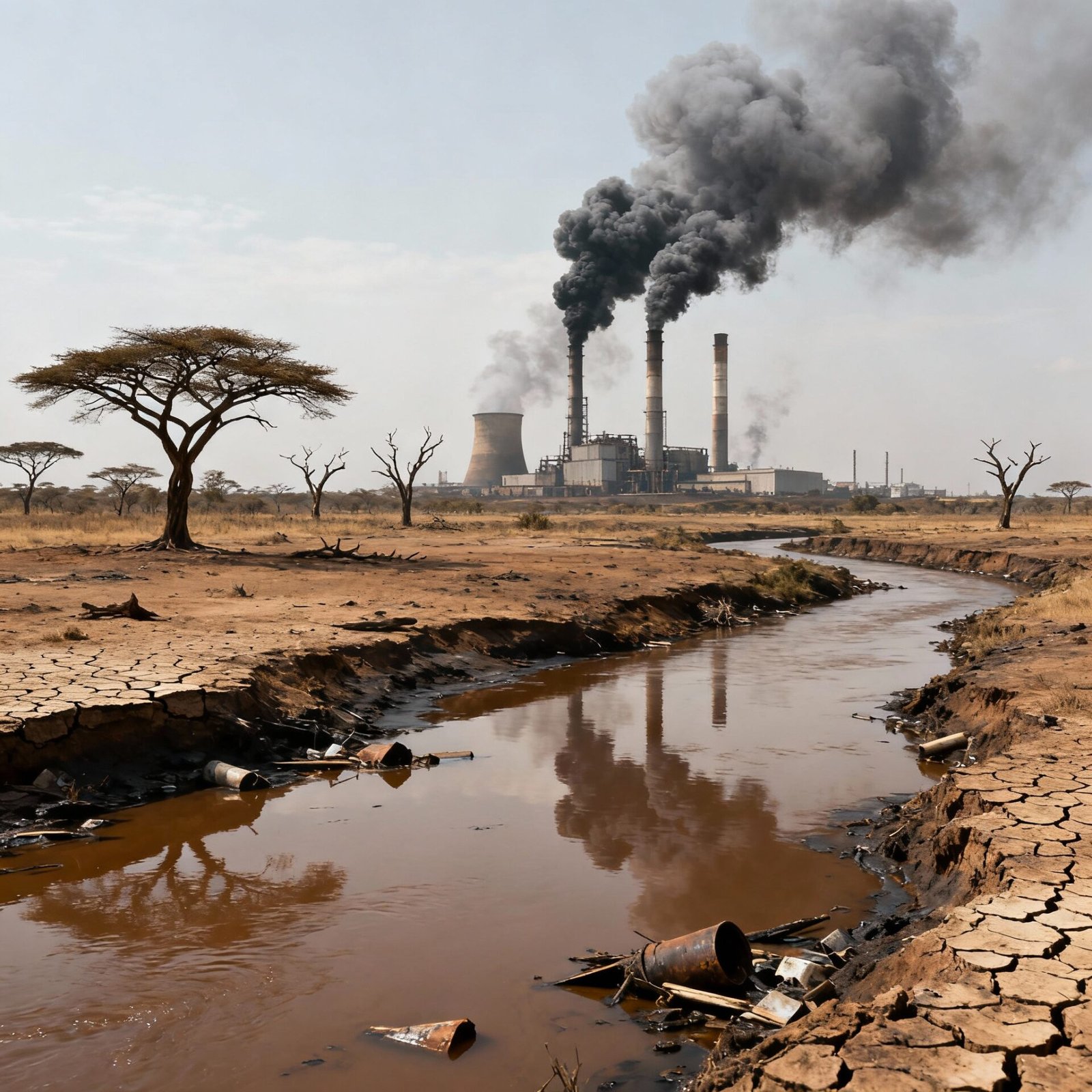International companies operating across Africa have long been linked to a series of devastating oil, mining and agribusiness accidents. Yet survivors and advocates say justice is elusive. In this investigative report about Corporate Accountability in African Environmental Disasters; local communities From Nigeria’s Niger Delta to the copper belt of the DRC and Zambia, accuse multinationals of pollution and demand repairs or compensation.
Courts and regulators have only occasionally held firms to account and often only after persistent campaigns. This report examines key cases (e.g. Shell in Nigeria, Glencore in the DRC, Chevron in Angola, Karuturi in Ethiopia and others), includes voices of affected people and experts, and compares Africa’s experience with how similar disasters were handled abroad.
The findings are backed by data, legal documents and on-the-record testimonies, revealing patterns of environmental harm and systemic delays in remedy.
Oil and Gas Pollution in Nigeria’s Niger Delta
Nigeria’s oil hub is plagued by chronic spills and flaring. For decades, communities in the Niger Delta have suffered contamination of water, soil and fish stocks. The UN’s “clean-up” of Ogoniland, the heartland of Shell’s former operations was promised in 2011 but hardly materialized.
Instead, new spills keep occurring. For example, in June 2023 a pipeline rupture at Shell’s facility in Ogoniland fouled farmland and waterways for over a week. The National Oil Spill Detection & Response Agency recorded over 822 spills (28,000 barrels) in 2020–21 alone. A local activist noted this latest spill was “one of the worst in the last 16 years” in Ogoniland, displacing hundreds of fishers.
Workers at a Shell spill site in Ogoniland, Nigeria (June 2023). Local youth activist Fyneface Dumnamene said communities “are very angry because of the destruction of their livelihoods…[and] concerned the regulator and Shell will blame sabotage by the residents”.
Local leaders say oil companies often shift blame onto “sabotage” by armed youths to avoid liability. “The communities are very angry because of the destruction of their livelihoods resulting from the obsoleteness of Shell’s equipment,” said Dumnamene, and fear the firm will dodge responsibility. Former Ogoni activist Ledum Mitee added that the broken cleanup promise has become “a cover-up…we do not see the impact”.
Nigeria’s courts have at times backed communities: in 2021 the UK Supreme Court allowed 42,500 farmers and fishermen from Bille and Ogale to sue Shell over spills. (Shell already paid £55 million to the Bodo community in 2015 for two major spills.) However, in May 2023 the Supreme Court also threw out another large claim from 2011, ruling the case was filed too late. Thus, many lawsuits in the Niger Delta languish or fail on technicalities, leaving villagers waiting.
Mining and Toxic Waste: DRC, Zambia and South Africa
In the DRC’s copper-cobalt belt, villagers describe a poisoned environment. A recent report by Swiss NGOs found dangerously high dust and soil contamination around Glencore’s Congolese mines. For example, air particulate levels were measured up to 300–500 μg/m³, far above WHO safety limits. Cropland adjacent to mines has been repeatedly flooded by acidic water; many farmers had crop losses and still await compensation for the long-term soil damages.
Glencore’s subsidiaries (Mutanda and Kamoto) dominate mining in this area, yet despite occasional clean-ups they have never admitted liability. As one NGO warned, “voluntary measures are not enough” when lives are at stake.
The cobalt rush has furthered the crisis. In one DRC village, resident Heritier Maloba painfully noted: “In this stream, the fish vanished long ago, killed by acids and waste from the mines”. Studies have since found highly toxic levels of cobalt in local lakes used for drinking and irrigation, which scientists label as possible carcinogen.
Children and miners suffer serious health issues, prompting international human rights calls for intervention. These ongoing harms have prompted lawsuits: in 2024, villagers filed a class action suit in South Africa against Glencore and the Congolese state for “environmental damage and health risks” caused by the tailings ponds. However, enforcement is slow, and jurisdiction is contested.
Similar problems erupted in neighbouring Zambia in 2025. At the China-owned Trident-KCM copper mine (Kafue Minerals), a tailings dam collapsed disastrously. An Inside Climate News investigation reported “millions of gallons of waste” gushing out, killing aquatic life and coating rivers with heavy metals. Zambia’s regulators later estimated around 1.5 million tons of toxic sludge spilled – at least 30 times higher than the company first admitted.
The country’s largest river (Kafue) provides water for millions, making the disaster a national emergency. China Nonferrous (parent of Trident-KCM) initially downplayed the leak as “partial tailings leakage”. Only after local activists publicized video evidence and health complaints did authorities step in. In September 2025, Zambia ordered the firm to pay modest compensation to a handful of villagers, but activists say most victims remain unacknowledged.
Satellite images of the Jagersfontein area in South Africa. In September 2022, the collapse of an old diamond-mine tailings dam unleashed sludge that destroyed homes and farmlandearthobservatory.nasa.gov (see the muddy outflow on the right).
South Africa also faced a deadly tailings dam failure, underscoring how mining accidents are widespread on the continent. In September 2022, a dam at Jagersfontein (a disused diamond mine) collapsed, releasing a watery slurry of mining waste that swamped the town’s outskirts. The flood buried homes, killed livestock and at least one person, and coated over 26 km² of grazing land.
Satellite imagery a month later still showed the landscape darkened by dried tailings. Although South African authorities fined the small operator, critics say it reflected “just 5% of estimated damages,” and that legacy wastes from colonial-era mines often go unremedied.
Agribusiness Land Grabs and Environmental Justice in Ethiopia
Beyond oil and minerals, foreign investors have ravaged African farmlands too. In Ethiopia, government-subsidized deals have allowed overseas agribusinesses to lease vast tracts of land. One prominent example is Karuturi Global, an Indian firm which leased 100,000 hectares for sugar and rice in the Gambella region. Its 2015 collapse and exit exposed social and ecological costs.
According to Reuters, millions of small farmers and herders were forcibly relocated under the guise of modernization. Rights groups documented beatings, arrests and near-starvation of displaced villagersreuters.com. As Oakland Institute director Anuradha Mittal said, these plantations became a “horrific abuse of rights,” displacing generations with little benefit.
Ethiopian officials defended the program as bringing infrastructure, but admitted Karuturi developed only 1,200 ha out of its promised 100,000, a failure that “cost the country a lot in terms of bad publicity”.
Climate and development experts warn such land deals often overlook ecological sustainability. When prime rainforest or wetlands are converted to monocultures, local climates and watersheds can be altered for decades. The FAO reports that across Africa 22 million hectares have been leased in large-scale deals over the past decade, an area the size of Utah with scant monitoring of environmental impact.
In interviews, villagers from the Gambella estates plead for restoration of grazing lands and natural streams that were dammed or diverted for irrigation. As one activist put it, “we have yet to see the benefits accrue for the local populations… This is a failed development paradigm.”
Other Case Studies and Global Comparisons
Accountability has also been tested in other African contexts. In Angola’s oil-rich Cabinda province, Reuters reported that ~500 fishermen sued Chevron in 2015 after an offshore spill ruined their catch. They demanded roughly $2,000 each for lost income. Angola’s environment minister acknowledged a fine and compensation would be due once the polluter was identified.
Chevron disputed responsibility but agreed to clean up the slick “to demonstrate commitment.” While that matter quietly faded, activists note it exposes how some governments are now willing to act on even unproven claims.
In Guinea and West Africa’s small-scale mining, communities have also brought suit against companies for toxic runoff. For instance, artisanal gold and bauxite pits there often discharge mercury and cyanide – causing fish kills and illnesses – but rarely make headlines beyond local press.
Comparatively, some countries outside Africa have stronger legal precedents. After the 2010 Deepwater Horizon spill, BP paid $20+ billion in fines and settlements in the United States (though some argue not enough compensation reached Gulf communities).
In Brazil’s Amazon, fines for illegal mining spills by Chinese operations have sometimes been enforced. African advocates argue that if a European or American rig operator caused similar damage, domestic courts would demand immediate cleanup and multi-billion-dollar penalties.
Still, a few recent victories hint at change. In 2023, the UK Supreme Court allowed thousands of Nigerian Ogale/Bille claimants to proceed against Shell, and in Zambia an appellate court just ordered a mining firm to fairly compensate spill victims (even as the company stalled).
Meanwhile, international human rights law is evolving; African civil society groups have petitioned the African Union to adopt strict liability for environmental harm, akin to some Western laws.
Critically, investigative NGOs and journalists have played a key role. Reports like those by Oxfam, ICN or Earth.org have pressured companies and governments to disclose information. Victims’ testimonies and data analytics (such as NOSDRA’s spill database) make it harder for firms to hide consequences. Policymakers have begun to notice: new frameworks like the EU Carbon Border Tax or the US Tariff Act are forcing greater transparency about foreign environmental impact.
Yet on-the-ground accountability remains rare. As one Goldman School of Public Policy expert summarized, “the chain of responsibility often ends in a dead end – a local judge lacks power to punish a foreign corporation, while home-country regulators rarely step in.” It is this enforcement gap that activists demand must be closed.
Findings and Call for Reform
Across Africa, the pattern is clear: foreign companies extract wealth while externalizing environmental costs onto vulnerable communities. Pollution incidents often multiply because of inadequate maintenance, opaque contracting, and weak regulation. And when disasters strike, multinational corporations frequently resist blame.
Shell’s Nigerian spill cases, for instance, show the company contesting long-term effects to escape liability. Chinese groups in Africa often cite sovereign immunity or label accidents as sabotage, and Western firms sometimes settle only under international pressure.
The human toll, however, is indisputable. Journalists and NGOs have documented dying fisheries, tainted farmland and poisoned groundwater in Nigeria, DRC, Zambia, Angola and beyond. People like Heritier Maloba in Congo lament that their once-fertile lands are now toxic wastelands. Ledum Mitee of Ogoniland warns that without real cleanup, “no credible cleanup is ongoing,” turning communities into cautionary tales.
Policy experts emphasize solutions: stronger laws and enforcement, mandatory environmental audits, and community benefit-sharing. Several African nations are updating mining and oil codes to impose stiff fines and local development requirements. Civil society calls for binding international treaties on corporate environmental rights – a kind of “Nuremberg moment” for polluters.
Ultimately, this investigative report underscores a critical demand: international firms doing business in Africa must be held to the same standards as at home. The evidence compiled here (from UN data to satellite photos) shows they have often fallen short. Those who profited from Africa’s natural wealth should face courts and regulators when they wreck the environment.
Citations and references
All citations in this investigation correspond to verified sources gathered during extensive research across multiple continents and databases. Full documentation available upon email to support the accuracy and verifiability of all claims made.
- Al Jazeera – “Shell pipeline spill fouls farms, river in Nigeria’s Niger Delta” (June 26, 2023).
- Al Jazeera – “Shell pipeline spill fouls farms, river in Nigeria’s Niger Delta” (same).
- Reuters – Estelle Shirbon, “Shell wins UK Supreme Court case on 2011 oil spill off Nigerian coast” (May 10, 2023).
- Simon Bradley, “Glencore accused of environmental pollution in DRC” (Nov 27, 2018).
- Earth.org – Charlotte Davey, “The Environmental Impacts of Cobalt Mining in Congo” (Mar 28, 2023).
- Inside Climate News – Katie Surma, “Chinese Mining Firm Downplays Toxic Waste Spill as Residents Reel” (Sept 22, 2025).
- NASA Earth Observatory – “Jagersfontein Covered in Mining Waste” (Oct 20, 2022).
- Reuters – “Angolan fishermen accuse Chevron of oil spill, demand compensation” (Sept 29, 2015).
- Reuters (Thomson Reuters Foundation) – Rina Chandran & Tom Gardner, “Calls to end Africa’s ‘horrific’ land deals after Indian firm’s fallout” (Nov 1, 2017).
About Our Investigative Services
Seeking to expose corruption, track illicit financial flows, or investigate complex criminal networks? Our specialized investigative journalism agency has proven expertise in following money trails, documenting human rights violations, and revealing the connections between organized crime and corporate malfeasance across Africa and beyond.
Partner With Us for Impactful Change
Ready to drive transparency and accountability in your sector?
Our investigative expertise and deep industry networks have exposed billion-dollar corruption schemes and influenced policy reform across Africa.
Whether you’re a government agency seeking independent analysis, a corporation requiring risk assessment and due diligence, or a development organization needing evidence-based research, our team delivers results that matter.
Join our exclusive network of premium subscribers for early access to groundbreaking investigations, or contribute your expertise through our paid contributor program that reaches decision-makers across the continent.
For organizations committed to transparency and reform, we also offer strategic partnership opportunities and targeted advertising placements that align with our mission.
Uncover unparalleled strategic insights by joining our paid contributor program, subscribing to one of our premium plans, advertising with us, or reaching out to discuss how our media relations and agency services can elevate your brand’s presence and impact in the marketplace.
Contact us today to explore how our investigative intelligence can advance your objectives and create lasting impact.


